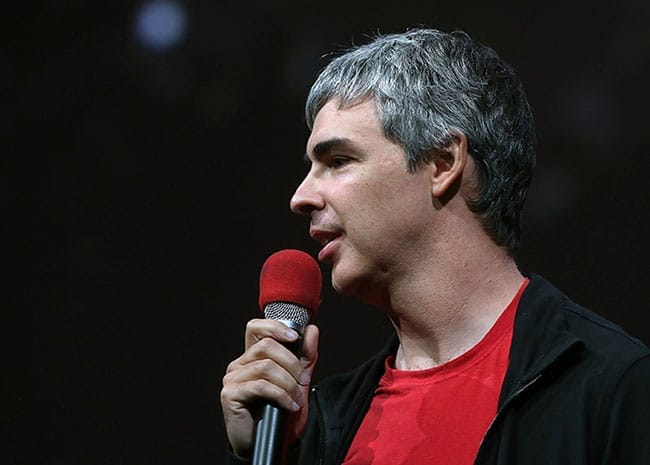
Photo credit: Brendon Thorne/Getty Images.
Google’s recent restructuring is 11 years in the making. In reality, it’s more like decades in the making. Yes, the ethos of Google’s split is far older than Google itself.
Alphabet, the company that will serve as Google’s parent, is about one thing: volatility. Alphabet specifically and volatility more generally matter to us all. Individuals, companies, governments, nonprofit organizations, activist organizations and communities—we’re all affected by Google’s news.
First let me provide context. Volatility—a continuous string of disruptions that reshape our socio-economic model—has created and destroyed nations, markets, wealth, social structure, boundaries and rules. In the commercial sector, disruption has introduced products that many can’t imagine living without: smartphones, tablets, digital cameras, the ability to watch Game of Thrones anywhere anytime and so on. We’ve become an interconnected society with (near) instantaneous ability to communicate, collaborate, create and compete. We’ve destroyed or started to destroy industries that couldn’t (or refused to) keep pace: film (think Polaroid), entertainment rental (think Blockbuster), wired communications (remember payphones?), coal, and on and on.
These days, disruption comes in four forms: technological, ecological, geopolitical and ideological. These four forms of disruption (which I refer to collectively as “volatility”) have rewired our now global economy for decades. Technology has helped settle wars that geopolitical, ideological and, yes, ecological (before oil there was tea, sugar and conflicts about other natural resources) differences sparked. So volatility has been around longer than Google (and now Alphabet).
This leads us to why Alphabet matters. Volatility disrupts in a relentless, unforgiving manner. Nothing, not even time itself, stands in the way of volatility. With our world facing ever more vexing, ever more complicated and ever larger challenges, we need to harness volatility’s ability to reshape the world as it currently is in order to solve these challenges. Larry Page and Sergey Brin formally announced on Aug. 10, 2015, that they are taking aim at solving these challenges. Not all of them. And certainly not alone. Alphabet is not a charity; indeed, its pursuit of commercial disruption holds the key to its ability to pursue solutions that are meaningful. Solutions that matter. Solutions that address volatility’s four disruptions.
I’m writing my next book, The V-Quotient: How To Thrive In Our Fractured World, with this idea—volatility can solve, not merely create challenges—at its heart. Taking my cue from books that have transformed into invaluable resources such as Blue Ocean Strategy and Competitive Strategy, I’ve studied strategic moves of over 100 companies competing in dozens of industries for clues about what causes volatility and how we can use volatility to better our world … and ourselves.
I’ve learned that entities—individuals, companies, governments, etc.—are most susceptible to volatility’s destruction when they become too big, too complex and too complacent. Empires, industries and companies have crumbled under their own largesse.
I’ve learned that to unleash volatility’s kinetic ability to solve vexing challenges, we need to embrace five principles. These five are:
- Challenge Assumptions.
- Develop A North Star To Provide Clarity Amid Chaos.
- Simplify.
- Master Two Ships: Leadership and Partnership.
- Embrace The Boundary-less Life.
Google’s Alphabet announcement provides an example of these five principles in action. Page and Brin are challenging the assumption that one big company operates more effectively than many smaller companies. They are using a North Star; as Larry Page wrote, Google (and now Alphabet) is about “do(ing) important and meaningful things with the resources we have.” Alphabet’s creation allows Google to focus on meaningful things unleashed from the complexity of running many divisions. Each of the companies under Alphabet is freed up to be run by strong leaders and pursue partnerships that might otherwise been in conflict with the Google mothership. And Alphabet enables Larry and Sergey to pursue solutions to myriad problems without being confined to one particular industry or one sector of the economy.
I’m not heralding Alphabet as the Messiah. It neither offers nor professes to provide a panacea to all of our ills. And there is an argument to be made that Alphabet’s birth might be tied to taxation concerns in the EU and/or reporting transparency concerns here in the States.
But when a successful, influential and truly disruptive company makes as courageous a move as Google did, it does give all of us the confidence and the kick in the pants to realize that we can, and frankly must, evolve too in order to become better, more effective forces of change.
Volatility isn’t just about causing problems; if we see and use it correctly as a catalyst, volatility can spark our ability to solve problems too.
That’s what Alphabet means to us. That’s why “G” is for Google and “Alphabet” is for volatility, and why this matters to all of us.

























